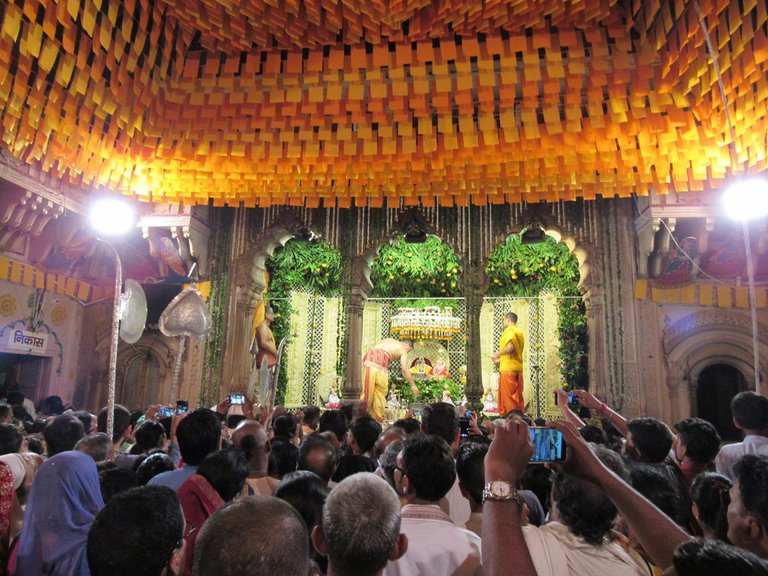
One of my favorite temples to visit here in Vrindavan is the temple of Sri Radharaman. This is one of the most special temple here in Vraja. It is special not because of its size or accessible location or architectural beauty. In fact, this temple is not big and is a little hidden and has no spectacular architectural prominence. But anyone who has gone to this temple will want to come again and again to relish the special mood of purity and devotion that abounds within the area and of course to get a glimpse of the enchantingly beautiful Radharaman. At times, it can be very packed because of its not so big size.
I always appreciate the speciality of smaller temples and that is by its limited space it makes everyone feel closer to each other and naturally closer to the worshipful Deity of the temple. I have been to some really huge and fantastically crafted temples and everyone is in awe as they are all spread out all over the vast space of the area with their focus kinda divided by all the opulence around and feeling distant from each other and the worshipful Deity of the temple.
Coming to Radharaman temple is like coming to my home and my family. And indeed, once you see the wonderful Deity of Radharaman, you can understand why this temple is so special. So let me share to you today some beautiful pictures of Radharaman that I have taken. I am happy that unlike the other main temples of Vrindavan, the temple caretakers and pujaris of Radharaman allow photography inside the temple. Yet it is not easy to take nice pictures with a big crowd pushing you at the back. But sometimes, temple can be empty and that is a great time to quietly take your pictures. Well, the pictures I am sharing here are actually not during those quiet times. I live a little distance from the temple so the only time I can visit there is in the evening when the big crowd comes for arati or the evening offering of lamps.
Before I proceed in sharing some photos. I would just like to mention that now Vrindavan is known as the City of Temples, where more than 500 temples are present. But not very long ago, before the appearance of Sri Chaitanya Mahaprabhu (531 years ago), Vrindavan was a dense forest. At that time, there was practically no temple of Radha Krishna. What to speak of temples, Vrindavan itself was like hidden. There is no information for the common people promoting the glories of Vrindavan and the different pastime places of Radha Krishna in this holy place. And this is because, at that time, hardly anyone knows about this subject matter. These extremely auspicious and highly elevated subject matter had been forgotten after passage of time. Actually this time period was within the violent times of Muslim conquest in India.
I mentioned Chaitanya Mahaprabhu because really it is only after Him that the path of spontaneous love (like the love of the residents of Vraja) to Krishna has been opened widely. He Himself came to Vrindavan and discovered Radha Kunda and Syama Kunda and He ordered his foremost followers, the six goswamis of Vrindavan (Rupa, Sanatan, Raghunath Bhatta, Gopala Bhatta, Raghunath das and Jiva) to reveal through their writings the glories of the name, form, qualities and pastimes of Radha and Krishna and to further discover all the holy pastime places of Radha and Krishna. If not for Mahaprabhu and His followers like the Goswamis, we will never know all these secret truths about the glories of Vraja where Vrindavan is one of it's principal forests. And why is Vraja or Vrindavan glorious? Because this Vraja is a manifestation of the original world of Sri Radha and Krishna and only in this eternal Vraja, God manifests His full sweetness as Sri Krishna and is relishing the greatest love from the Vrajavasis. The nature of the love of the Vrajavasis is that they cannot see Krishna as "God", as someone to worship in opulence or out of duty or fear. They only see Him as their most Beloved, their all in all. In Vraja, Krishna is tasting the various sweet flavors of love (we call rasa in Sanskrit) from those in the mood of servants, mood of friendship, mood of parents, or mood of romantic love. This is a whole big and deep subject matter which needs a separate post or series of posts. But I am mentioning this because it is this subject of bhakti rasa or flavors of love that has been established by the followers of Chaitanya Mahaprabhu like Rupa Goswami and those in his disciplic line. And by establishing this, they are establishing the superiority of the love of the Vrajavasis, and within the love of the Vrajavasis, the love of the cowherd girls of whom Radha is the foremost. So when Mahaprabhu appeared, He was aborbed in the love of Radha and distributing the mood of love of the cowherd girls who are serving Radha. He has taught how far higher than worship of God in the mood of opulence (which can lead one Vaikuntha, the spiritual world of Lakshmi Narayan where God is seen as God) is devotion to God in spontaneous love following the moods of the Vrajavasis which leads one to the highest realm of the spiritual world called Vraja.
So fulfilling the order of Mahaprabhu, the Goswamis and their followers (1) discovered all the pastime places of Radha Krishna in Vraja, (2) wrote many books to propagate the philosophical foundations of bhakti rasa and to reveal the incomparably sweet pastimes of Radha Krishna. (3)So to help everyone be established in loving relation with Radha Krsna in the mood of the vrajavasis, they manifested Deities and established temples. (4)And on a practical level to help practitioners of this path of spontaneous devotion not imagine this path as something cheap or independently done, they provide all guidelines to progress by compiling and writing books on proper etiquette and on rules and regulations.
So the Deity of Radharaman is the Deity served by and established by Sri Gopal Bhatta Goswami, one of the six goswamis in Vrindavan. I would love to talk about Gopal Bhatta Goswami as much as the other Goswamis like Rupa and Sanatan and the other hidden ones like Lokanath Goswami and Bhugarbha Goswami but that too is a broad subject we can leave for later posts.
When Gopal Bhatta Goswami was traveling to different pilgrimage places, he came to the Gandhaki River in Nepal which is a source of sacred stones the Vedic scriptures call shalagram shilas. These shilas look like stone but they are not ordinary and material. They are of divine origin and are actually worshipable objects that one can see as a special manifestations of God.
Once while Gopal Bhatta Goswami was taking a bath in this holy river and taking some water with his begging pot, twelve shalagram shilas automatically would enter his pot. He would return back the water to return the shilas. But then when he would again scoop for water, these twelve shilas would come back inside his pot. After this went on again and again, he concluded that these twelve shilas wanted to come with him. So from that time on, he kept and regularly worshiped these twelve shalagram shilas. And why twelve? (Well why not, if that is what God wants?) In my opinion, just as the goswamis are teaching about bhakti rasa or flavors of love, twelve shilas came to be with him because as Rupa Goswami taught, there are twelve flavors or rasa that God and his devotee are reciprocating with each other. Of this twelve rasas, five are primary and seven are secondary. The five primary rasas refer to permanent flavors or moods of love that a devotee can have (like passive, servitude, friendship, parental, and amorous love) and the secondary are temporary emotions or moods that can nourish the primary ones (like comedy, chivalry, compassion, fear, disgust, anger, wonder). I will leave further discussion on this subject hopefully in the future.
So later when he was in Vrindavan, during the full moon night in the month of Vaisakha (that is within April and May in western calendar and in the spring season in 1542 AD, one of the twelve shilas transformed into a beautiful Deity! And guess who is this self-manifest Deity? That is Radharaman! This is one amazing pastime of God to prove that shalagram shilas are indeed not ordinary stones. They are special manifestations of God for us fallen souls whose heart are like stones. To those whose heart are like stone, they will see shalagram as stone. But if we worship shalagram shila as prescribed by the scriptures, we can actually become purified and can begin to experience bhakti rasa, the different mellows of love with God that finally we will realize God's personality, and how serving Him brings the greatest pleasure. This is why His name is Radharaman. As I have mentioned Radha is the name of Krishna's greatest lover. All the flavors of love is coming from her. She is the Deity of love. Raman means giver of pleasure. So there are countless meanings to the name Radharaman. He is the Deity of love and pleasure. He gives the greatest pleasure to Radha. He is one who is only satisfied and pleased by Radha. He gives transcendental pleasure to those who serve Radha. etc.
So the temple of Radharaman is one of the original temples established by our goswamis. From the time of our goswamis, more and more temples are established until the 1660's to 1670's when the new muslim emperor of Delhi named Aurangzeb began destroying temples and Deities in Mathura and Vrindavan. It was during this time that all temple priests in Vrindavan arranged for the safe escape of all Deities to Jaipur. So the Deity of Madanmohan (served by Sanatan Goswami, the Deity of Govindadev (discovered by Rupa Goswami), Gopinath (served by Madhu Pandit), Radhavinoda (of Lokanath Goswami), Radha Damodar (manifested by Rupa Goswami and served by Jiva Goswami), and other important Deities like the Deity of Vrinda devi (the custodian of Vrindavan herself) all left Vrindavan along with many devotees. But only one Deity remained and never left. Guess who? Radharaman! Jaya Radharaman!
I don't mean to write too long. But please forgive me for talking too much and taking much of your time. So here have darshan of Radharaman to your heart's content...
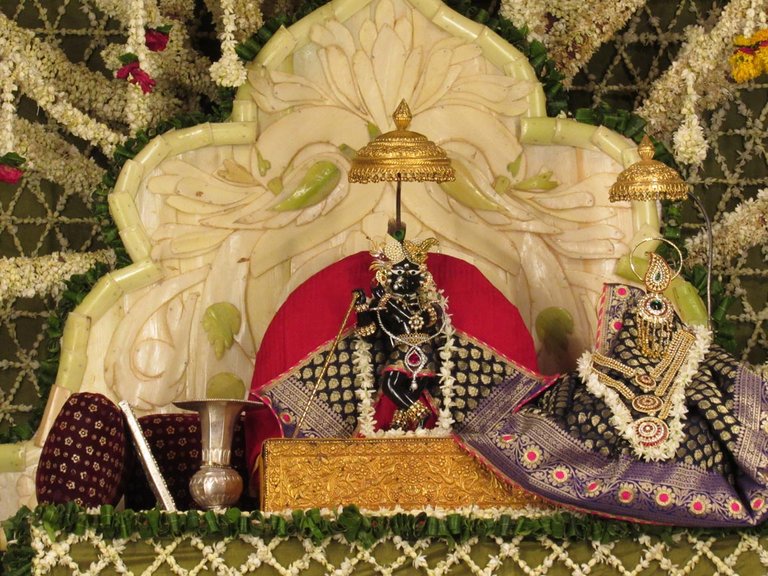
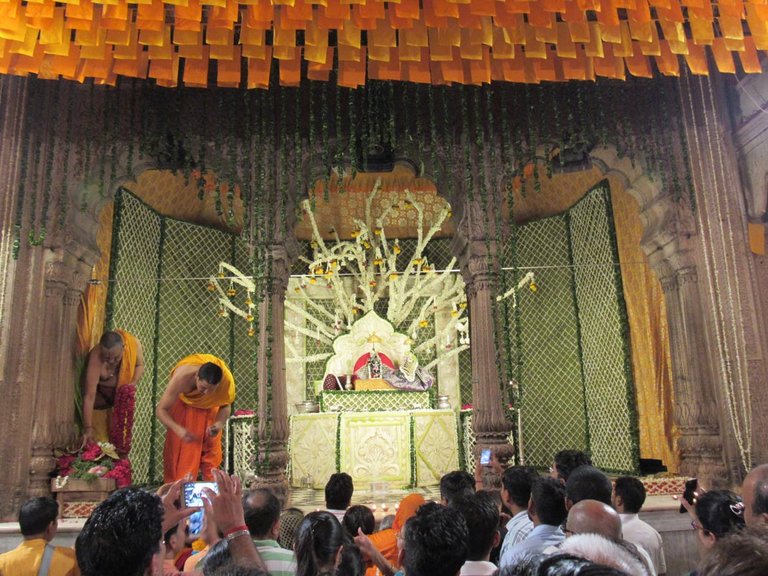


Here is one of the closest pictures I have taken of Radharaman. Here you can see His teeth! Isn't that amazing. He has teeth.
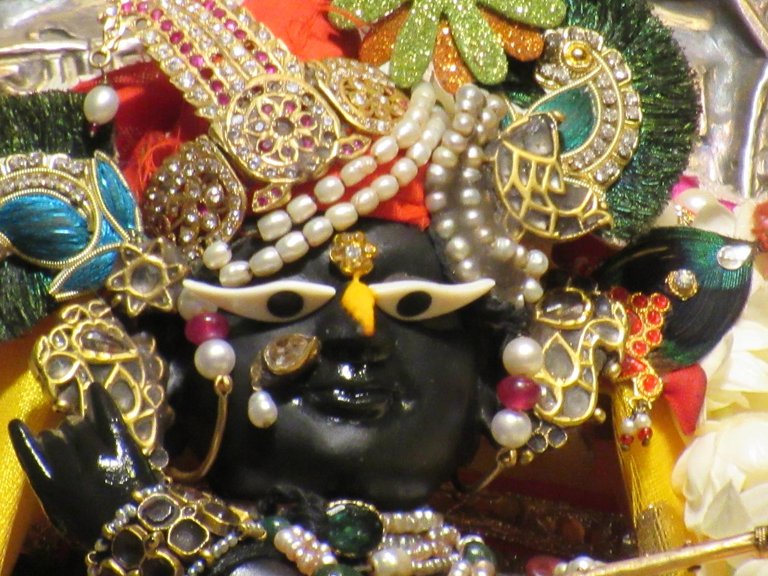
Here His mouth is oily. Because He likes to eat butter. In fact He is known as a butter thief of Vraja. So in the next picture below you can see His hands are buttery too.
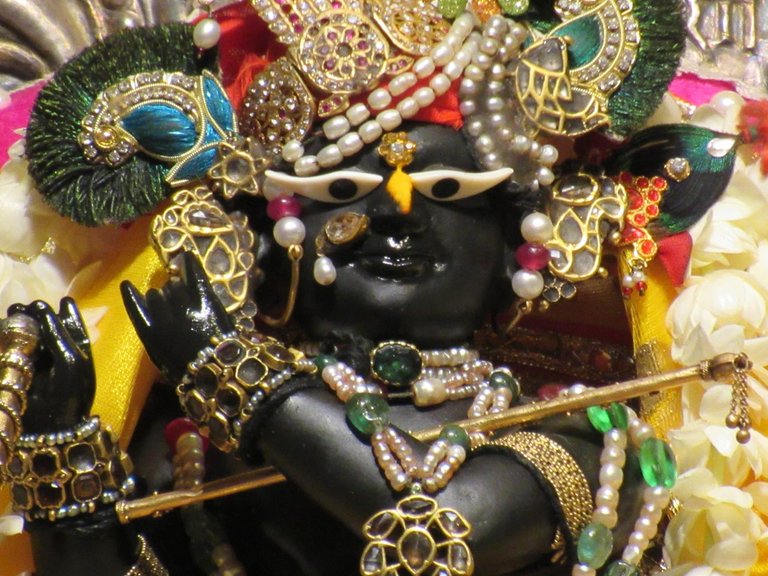
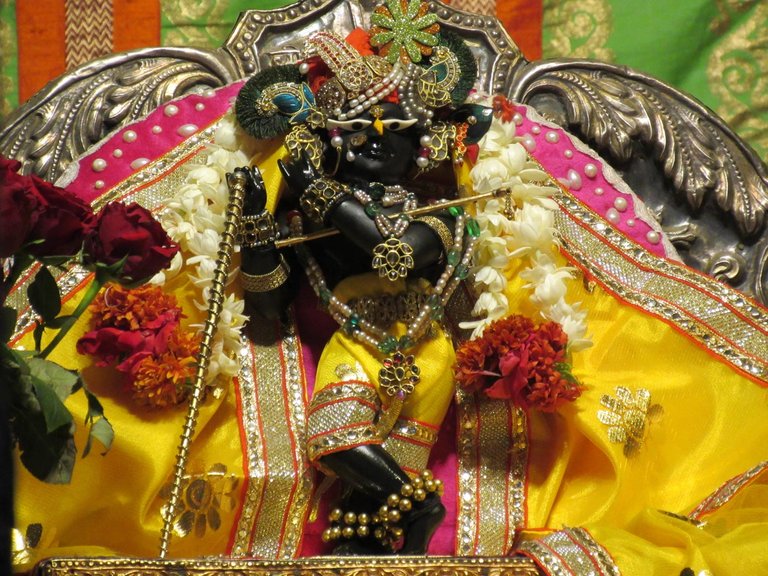

This picture was taken during Snana Yatra or bathing festival. 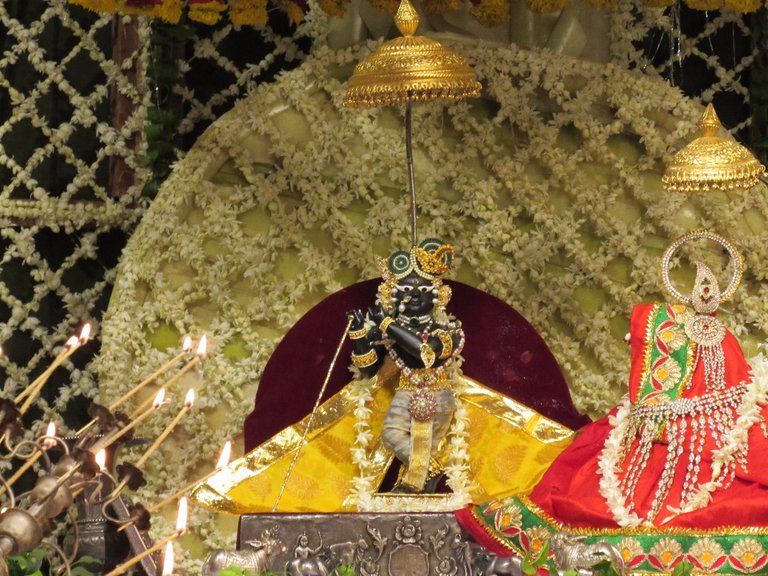
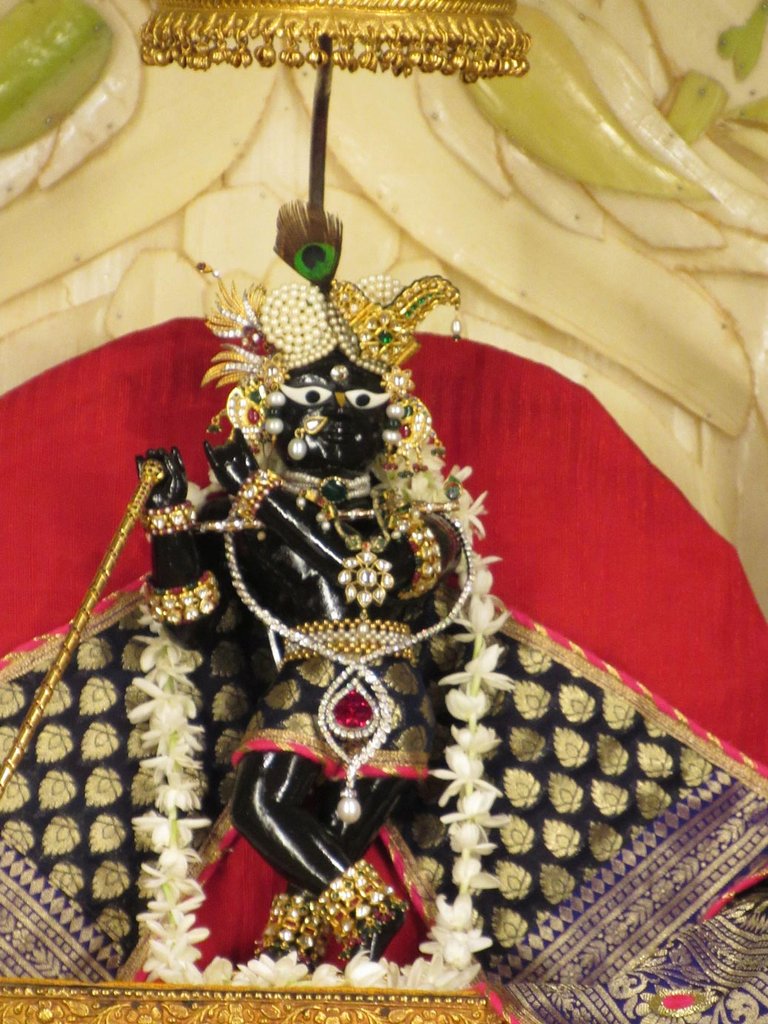
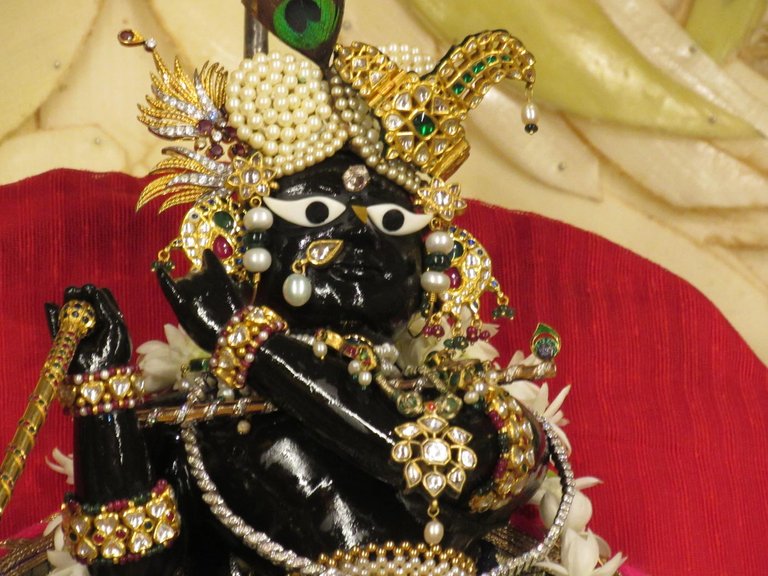
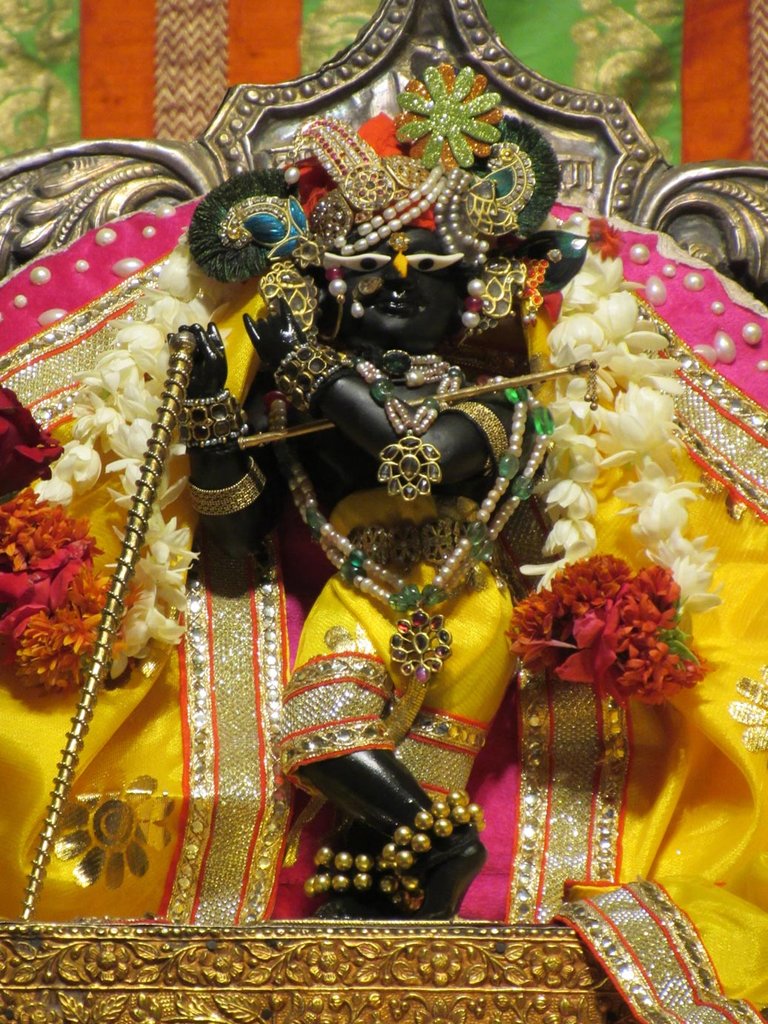
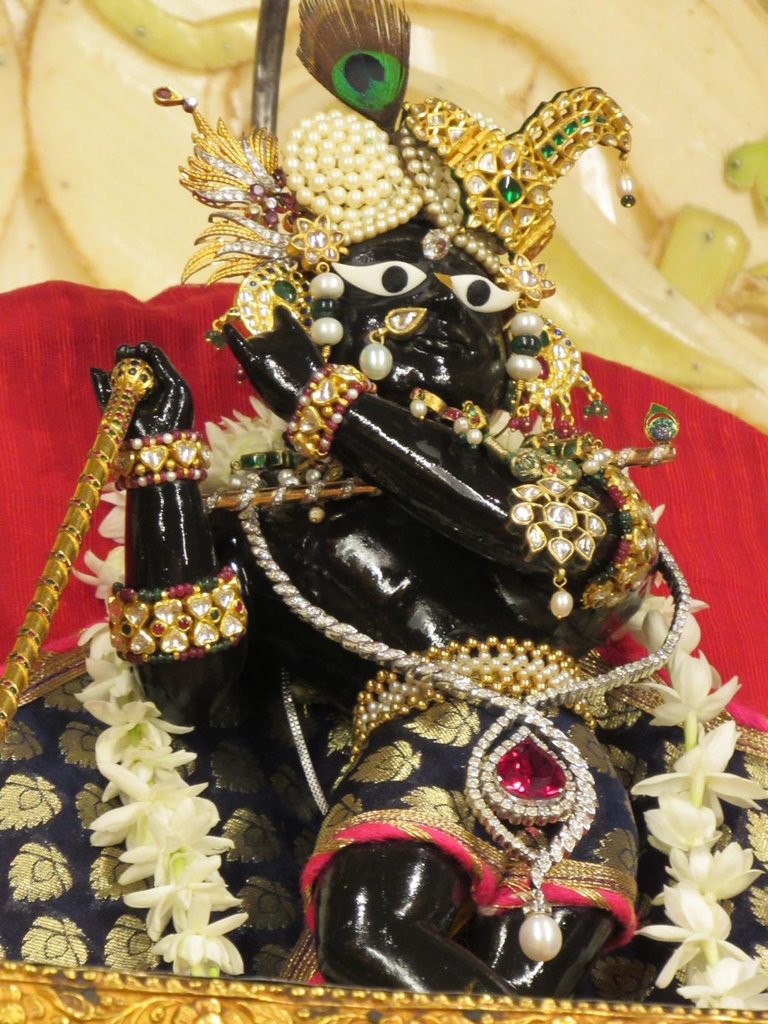
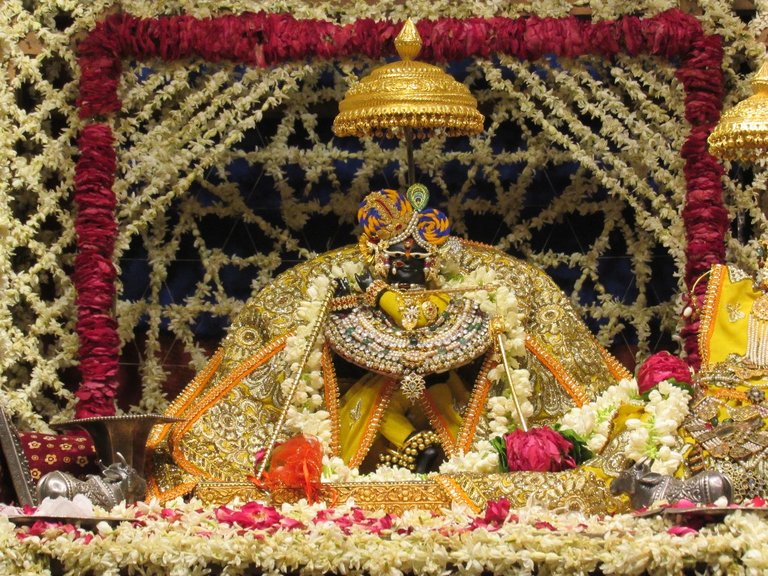
Hare Krishna! Jaya Radharaman! Jaya Vrindavan!
May god bless you...Jai Hind ...I upvoted you ...I am following you
Thank you!
Lovely!!! Thank you for this priceless gift you are sharing to the Steemit community!
Congratulations @vrajanitor! You received a personal award!
You can view your badges on your Steem Board and compare to others on the Steem Ranking
Do not miss the last post from @steemitboard:
Vote for @Steemitboard as a witness to get one more award and increased upvotes!